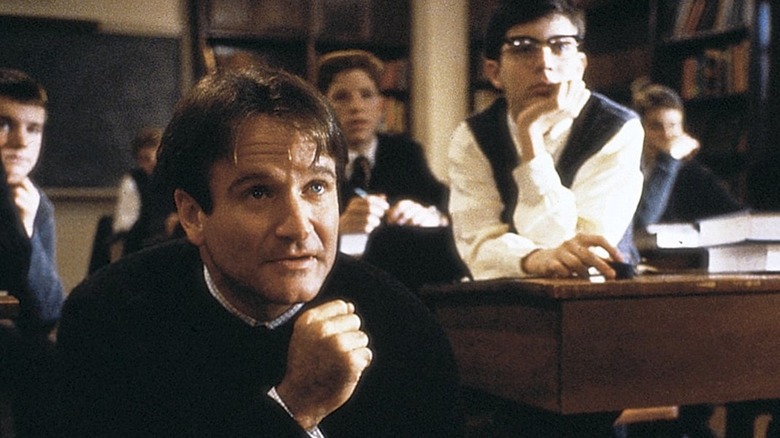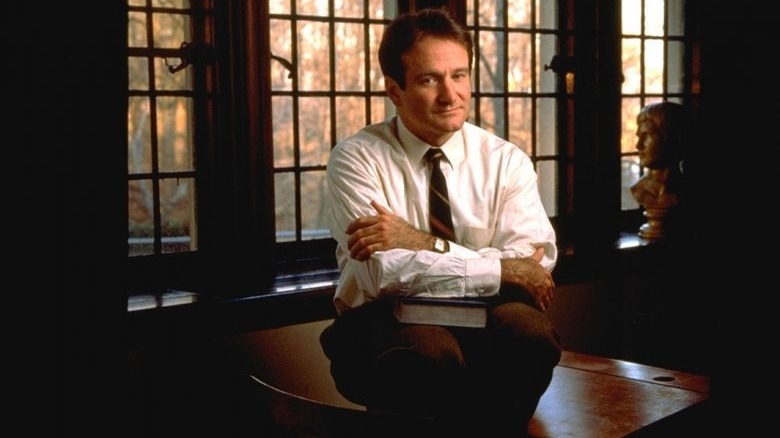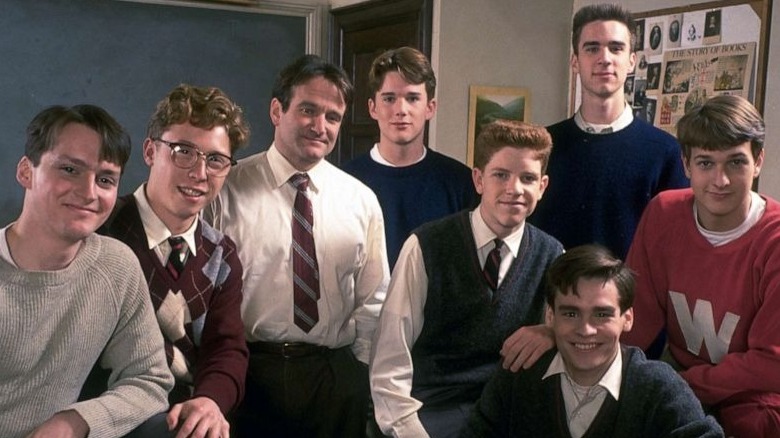Dead Poets Society's Original Ending Was In Desperate Need Of A Rewrite
"Dead Poets Society" is one of the most emotional movies I've ever seen. Every time I watch it, I'm reduced to a puddle of tears — especially the ending where John Keating's students stand up on their desks and salute him with a rendition of "O Captain, My Captain" by Walt Whitman as their beloved teacher departs Welton Academy. But believe it or not, screenwriter Tom Schulman originally had an even sadder ending in mind.
Schulman participated in a retrospective celebrating the 30th anniversary of "Dead Poets Society" for Script Magazine in 2019, alongside star Ethan Hawke and director Peter Weir. During the retrospective, Schulman discussed the early version of the script, which would have revealed that Keating had leukemia. This decision apparently informed the professor's desire to seize hold of life — after all, if you're dying, why not live your last days to the fullest? As Schulman explained:
"When I got to a later stage of the screenplay—around page 70 or 80, I started to feel a need to explain why Keating had this 'Carpe Diem' philosophy that was so important to him, so I decided he'd have a fatal disease, but one like Hodgkin's lymphoma, where you can live 20 or 30 years, but it'll ultimately shorten your life, and you will die prematurely."
It's a storytelling solution that might have worked in theory, but in practice this version of "Dead Poets Society" almost drove Weir away from the project.
O Captain! My Captain!
Director Peter Weir recalled that he met with then-Disney chairman Jeffery Katzenberg (he of the ill-fated Quibi) and read the "Dead Poets" script on a plane to Sydney. However, the ending was almost a dealbreaker for him.
"So, when Jeff rang a couple of weeks later, and asked, 'What do you think?' I said, 'Look, I'm going to pass.' And he said 'Why?' And I said, 'Because you go through the whole story, and it's about seizing the day, and you have this wonderful, inspiring teacher, who I would have followed, and I would have definitely become part of the "Dead Poets Society," but then you come to the scene with Keating in the hospital, and you realize he's got leukemia, and that's why he was saying "seize the day"? Well, who wouldn't say that under those circumstances?'"
This led to Katzenberg coming up with a rather unique solution; he suggested that Schulman cut the cancer subplot altogether, which had led to the original ending. Though Schulman agreed to do so, he still had to talk with Weir about the change. Weir was adamant that the scene be changed, and that he would walk from the film if it remained in Schulman's draft. However, the two eventually came to an accord.
Carpe Diem
The "O Captain! My Captain!" ending came to be when Weir told Schulman that there was a way for the "Carpe Diem" mantra to still take root in the mind of Keating's students without killing him off.
"But then he said something I completely agreed with, when he explained that at the end of the movie, when the boys stand on their desks, it would be easy to make that gesture for somebody who's dying. But if he's not dying, then we know they're standing up for the values he's taught them, which is much more powerful. When I heard that, I thought, 'Damn it, Peter, you're right.' And that was the end of it."
Indeed, that ending has still stuck with people all these years later — to the point where it been referenced and parodied multiple times. Schulman also revealed that Dustin Hoffman was originally slated to play Keating, and was committed to the original ending to the point where he lost 20 pounds to play the role of Keating. Skilled as Hoffman is, I can't personally see him in the role; Williams' energy and approachable demeanor is a large part of what made such Keating a well-rounded and memorable character. And without that performance, "Dead Poets Society" wouldn't be the timeless classic that still makes us bawl to this day.


